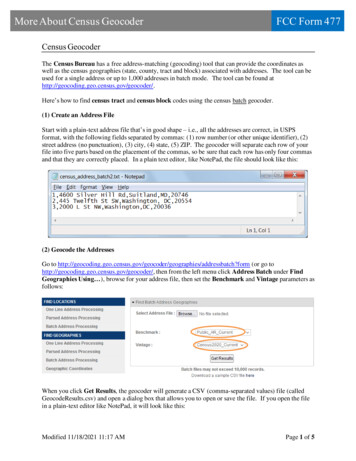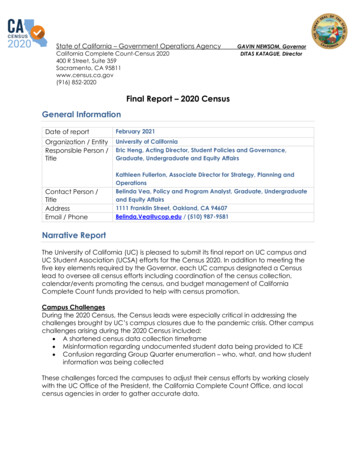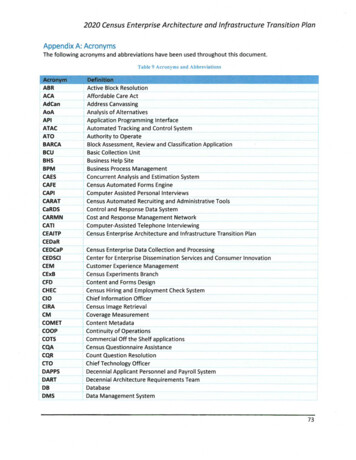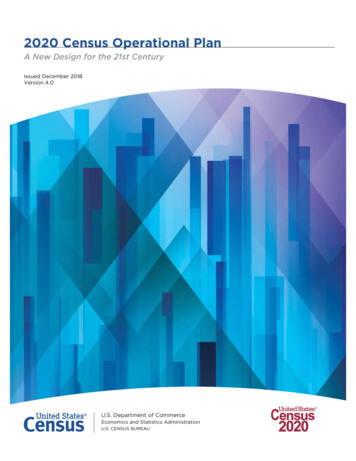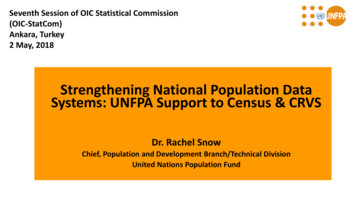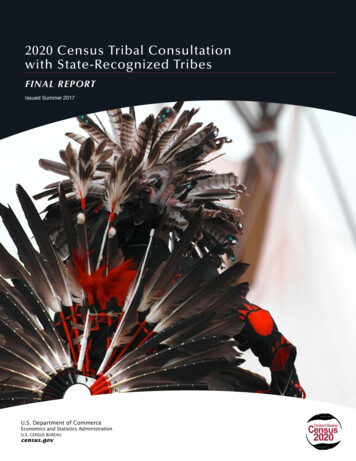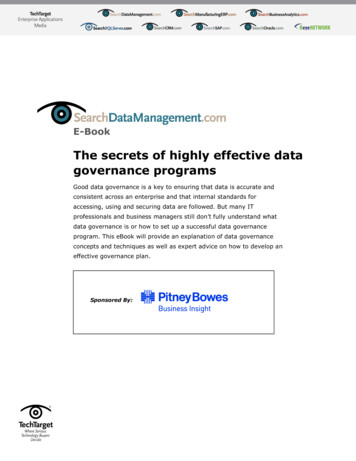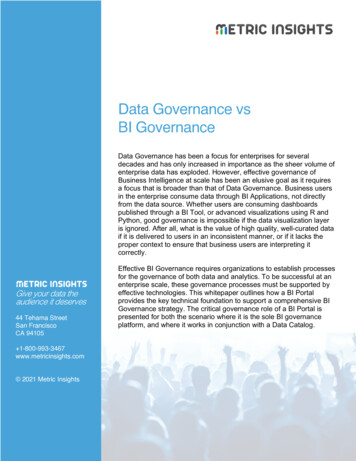
Transcription
Data GovernanceBoard Charter1
17/20Revision DescriptionInitial DraftUpdated with DEPDIR/COS/PCO feedbackFinal DraftUpdated with DSEP feedback2Author/EditorJennifer GoodeJennifer GoodeJennifer GoodeJennifer Goode
Contents1.Purpose . 42.Scope and Goals . 43.Background and Authority . 54.Objectives. 55.Outcomes . 56.Membership . 67.Roles and Responsibilities . 78.Meetings . 79.Related Documents . 710. Approval Signature . 73
1. PurposeThe Census Bureau Data Governance Board (DGB) 1 will fulfill the Office of Management andBudget’s (OMB) guidance on the implementation of the Foundations for Evidence-BasedPolicymaking Act of 2018 (Evidence Act), and will support the Census Bureau’s implementation ofthe Federal Data Strategy (FDS). The DGB 2 is a subcommittee of the Data Stewardship ExecutivePolicy (DSEP) Committee.The purpose of the DGB is to ensure that Census Bureau data is fully leveraged as a strategic assetby:a) serving as a decision-making body to establish data governance policies and prioritiesconsistent with the existing laws, regulations, and policies;b) supporting strategies for the effective management and sharing of bureau data;c) providing guidance on data asset management practices across the entire data lifecycle;d) supporting priorities, such as those identified in strategic plans and learning agendas, byinforming Strategic Management Plans for the bureau and identifying resources toimplement those priorities;e) enabling effective collaboration with non-federal stakeholders, federal interagency partners,the Department of Commerce, and bureaus and offices;f) supporting the Chief Data Officer (CDO) initiatives and ensure appropriate priority settingand corresponding resource allocation; andg) periodically assessing data governance efforts relative to overall data and analytics progress,and adjust Census Bureau’s approach, resourcing, and priorities as required to maximize theuse of data as a strategic asset.2. Scope and GoalsA commitment to data governance is fundamental to the use of data as a strategic asset. Theactivities required by the Evidence Act, and supported by the 2020 Federal Data Strategy ActionPlan, are the responsibility of many stakeholders.The primary goal of the DGB is to maximize the value of the Census Bureau’s data assets in meetingthe Census Bureau’s strategic goals consistent with applicable laws and regulations, mission, andresource constraints. The Census Bureau shares the Department’s goal of all data received, held, orcreated by the Census Bureau, including mission, financial, programmatic, workforce, andperformance data are structured, maintained and shared to maximize their value in carrying out theCensus Bureau’s mission, particularly the development of evidence needed to improve policy andoperations.The Census Bureau Data Governance Board parallel’s the Department’s Commerce Data Governance Board(CDGB). The purpose of the CDGB is to ensure that Commerce data is fully leveraged as a strategic asset by;serving as a decision-making body to establish data governance policies and priorities consistent with existing laws,regulations, and policies; developing strategies for the effective management and sharing of Department data;providing guidance on data asset management practices across the entire data lifecycle; promoting effectivereporting and communications for data operations; and enabling effective collaboration with non-federalstakeholders, federal interagency partners, and the Department’s bureaus and offices.2This DGB charter supersedes the current Data Management Committee (DMC) charter dated February 2018.Upon ratification of this charter, the DMC will be moved under the authority of and report directly to the DataGovernance Board (DGB) instead of DSEP. Accordingly, the DMC should revise its charter to reflect its new role asan advisory group that provides technical and management support directly to the DGB.14
3. Background and AuthorityThe Evidence Act establishes processes for the federal government to modernize its datamanagement practices, evidence-building functions, and statistical efficiency to inform policydecisions. Memorandum M-19-23, issued by the Office of Management and Budget (OMB),provides implementation guidance pertaining to the Evidence Act, and describes activities related toevidence-building, data management, data access, and information protection. 3 The guidancerequires all federal agencies 4 to establish a Data Governance Body that will “set and enforcepriorities for managing data as a strategic asset to support the agency in meeting its mission”. 5 Inaddition to the Evidence Act, the 2020 Federal Data Strategy (FDS) Action Plan includes therequirement for agencies to establish an inclusive and empowered Data Governance Body. 64. ObjectivesKey objectives for the DGB are: To manage data as a strategic business asset;To promote efficient access to and appropriate use of data;To leverage data as a strategic asset for evidence-based and operational decisions;To build a culture that values data and promotes public use; andTo govern, manage, and protect Census Bureau data.5. OutcomesThe DGB will coordinate the necessary resources, inform strategic planning, and set the necessarypolicies in order to: Identify data needed to answer priority Census Bureau questions (Priority Goals);Ensure Census Bureau priority questions are identified in the Learning Agenda and BudgetSubmittals;Ensure data acquisition for the data needed to answer Census Bureau priority questions areaddressed in strategic planning;Publish data governance materials on census.gov/data;Perform a skills gap assessment of staff data skills and literacy;Perform a technical maturity assessment of data platforms;Define and publish an Enterprise Segment Architecture for Data;“The Foundations for Evidence-Based Policymaking Act of 2018.” P.L. 115-435. Jan. 14, AW-115publ435.pdf3Title I of the Evidence Act and some FDS Actions only apply to CFO Act agencies, however, non-CFO Act agenciesand sub-agencies, operational divisions, and bureaus within CFO Act agencies are encouraged to meet theserequirements and milestones as appropriate. For Title II of the Evidence Act, the definition of “agency” comesfrom 44 USC §3502, and for Title III of the Evidence Act, the definition of “agency” combines agencies under 44USC §3502 and 31 USC §102.5“Phase 1 Implementation of the Foundations for Evidence-Based Policymaking Act of 2018: Learning Agendas,Personnel, and Planning Guidance.” M-19-23. Office of Management and Budget. July 10, 2019. Pg. 19/07/M-19-23.pdf4“2020 Federal Data Strategy Action Plan.” Pg. 24. -datastrategy-action-plan.pdf65
Publish a Data Strategy and Roadmap that address any deficiencies in data skills ortechnologies;Inject data needs into capital planning;Oversee lifecycle data management;Ensure data literacy is incorporated into individual development plans and staffing plans;Publish and maintain the Census Bureau Open Data Plan;Continuously monitor and improve the timeliness, completeness, consistency, accuracy,usefulness, and availability of the Census Bureau’s open data;Publish and maintain a complete Census Bureau data inventory,o Ensure the inventory is documented with appropriate metadata;Identify common data standards for use by the Census Bureau; andPublish and enforce data policies that address categorization, privacy, sensitivity, and anyother factors that may inform a preference to open data.6. MembershipAccording to OMB M-19-23, the CDO will chair the committee. Other members should include“appropriate senior-level staff and technical experts needed to discuss and set policy on a range ofdata and data-related topics. The makeup.should be driven by the agency’s needs and structures”. 7The list below identifies consistent contributors 8 to the DGB: Chief Data OfficerEvaluation OfficerStatistical OfficialChief of StaffChief Administrative OfficerChief Financial OfficerChief Budget OfficerChief of Program Performance and Stakeholder IntegrationChief Information Security OfficerChief Technology OfficerChief Policy Coordination OfficeChief Geography DivisionAssistant Associate Director for CommunicationsLead Legal CounselMembers-At-Large 9“Phase I Implementation of the Foundations for Evidence-Based Policymaking Act of 2018: Learning Agendas,Personnel, and Planning Guidance.” OMB M-19-23. July 10, 2019. Pg. 20-21. 07/M-19-23.pdf7“The newly-designated positons (Chief Data Officer, Evaluation Officer, and Statistical Official) all play a key rolein leading these activities, including addressing new reporting requirements . “These senior officials will alsoserve on a newly required Data Governance Body inside their agency ” OMB M-19-23. July 10, 2019. /2019/07/M-19-23.pdf8Members-at-Large include program area representatives, and subject matters experts appointed to representtheir respective areas.96
7. Roles and ResponsibilitiesThe DGB members or their designee will: Review and prepare for discussion of agenda items and artifacts before meetings; Review and comment on meeting minutes and decisions; and Communicate decisions and recommendations to appropriate leadership and stakeholders.8. MeetingsMeetings will occur on a monthly basis, or as needed. A call for agenda items to each invitee will be made 5 working days prior to each meeting.Artifacts informing a DGB decision will be shared 2 working days prior to the meeting.Meeting presentations will be completed and distributed to working group members andattendees within two business days of the meeting.Meeting agenda and minutes will be completed and distributed to working group membersand attendees within three business days of the meeting.A SharePoint Team Site will be established to promulgate and collaborate on all DGBactivities in a transparent manor.The Policy Coordination Office will provide staff support for the DGB.Matters considered by the DGB shall be resolved through concurrence. For a decision to be made,there must be representation from two of the three data principals (CDO, EO, SO) and fourmembers or their alternates.9. Related DocumentsThe links below provide additional information on the work of to be accomplished by the DGB. Commerce Data Governance Board (CDGB) Terms of Reference Federal Data Strategy 2020 Action Plan OMB M-18-23 Phase 1 Implementation of the Foundations for Evidence-Based Policymaking Actof 2018: Learning Agendas, Personnel, and Planning Guidance Foundations for Evidence-Based Policymaking Act of 201810. Approval Signaturesigned by RON JARMINRON JARMIN DigitallyDate: 2020.08.20 07:35:55 -04'00'Ron JarminChair, Data Stewardship Executive CommitteeChief Data OfficerU.S. Census BureauDate7
Summary InformationPolicy TitleVersionPolicy OwnerPCOPolicy ContactJennifer Goode, PCOCensus Bureau’s Data Governance Board CharterData Governance Board Charter, August 2020Office Responsible forPCOImplementationOffice Responsible forPCODisseminationAnnuallyPolicy Review Cycle8
This DGB charter supersedes the current Data Management Committee (DMC) charter dated February 2018. Upon ratification of this charter, the DMC will be moved under the authority of and report directly to the Data Governance Board (DGB) instead of DSEP. Accordingly, the DMC should revise its charter to reflect its new role as

